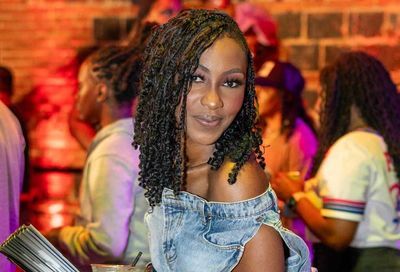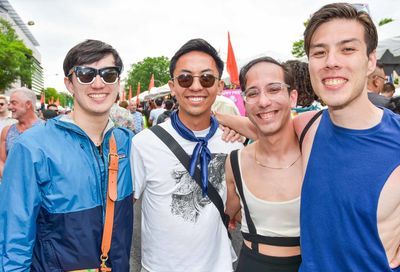Environs
Four men open their Victorian as a new gay guest house in DC
 |
TAKE YOUR BEST GUEST! Amazing guesthouse accommodates all of your room and board needs. Stylish design, fireplaces, huge loft, one block from new convention center. Occupants are four live-in GM’s who’ll take care of the cooking and cleaning so you get out the door on time. |
 |
Randy Kuczor, Tom Bell, Mike Mollock and Ron Wilkerson run — and live at — the D.C. Guest House, a stylish, gay-owned bed and breakfast located in downtown Washington. Though they’ve lived there for five years, they’ve only been open for business since May. So far, the endeavor has been a rollicking success.
RANDY [in room #2]: We got a call from some people in Australia who want to stay here for a year. We’re considering it. That’s not just a “Sure, give us your American Express number” deal.
TOM: We have to make sure we’re all going to get along.
RANDY: That’s why we like to handle reservations ourselves rather than go through a service. You can tell if you’re going to connect with a guest. It’s not like a hotel. We’re living here with them. If you’re not getting along on the phone, you’re not going to get along in the house. We’ve made arrangements for people to go to another guesthouse before because they were more of the bathhouse mentality.
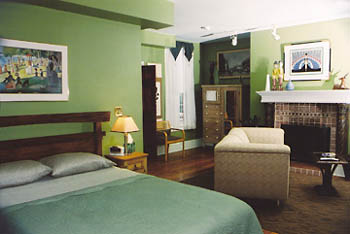 Base of Operations: The D.C. Guest House opens its doors for visitors. |
TOM [in room #4]: People know that this is not a place where you can do things on the couch downstairs.
RANDY: Yes, it’s a gay-owned bed and breakfast, not a gay-owned bathhouse. God forbid people should have sex in a rented room, but it happens. That’s why we make it a point to say, these are your bath towels. They’re Egyptian cotton. And these are your trick towels. They’re 98 cents. I hate when you stay at a hotel where the towel is so thin that you can’t dry off, or so thick that it’s like a rug. We’re out there, feeling the texture of towels.
 Mi casa es su casa: Randy, Tom, Mike and Ron have made their home life their livelihood. The guests find more cozy comfort and camaraderie than a hotel offers — so much so that many guests prefer eating in the kitchen with the boys to being served in the dining room. |
We go everywhere from Crate & Barrel to flea markets to find stuff for the rooms. We function more as a family unit than friends. We had always joked that if we ever lost our jobs we could turn this place into a bed and breakfast. Well, lo and behold, 9/11 happened, we were unemployed and we did it. I used to have visions of myself turning into Mrs. Madrigal from Tales of the City, walking around, carrying cats.
TOM [in bathroom]: This used to be an elevator shaft. We left in the original gears and weight stack. When this house was a mortuary in the late 1800s, this was the workshop. The elevator was used for lifting caskets.
RANDY: By the time we bought it, it had been the 10th Street Art Gallery for twenty years. We have artwork from every decade since 1840 represented in the house. You can’t see this house at a glance. You can stay here for a week and see something on the last day that you missed the whole time you were here.
TOM [in kitchen]: We perform all the services for the guests together and it goes by just like that. In the wintertime, if one of the guests wants a fire in the fireplace, we’ll build it for them. For breakfast, people can have just coffee or a full spread. Randy does all the cooking.
RANDY: Most guests ask if they can eat in the kitchen with us rather than in the dining room, though. We’ll use the dining room for brunch on Saturday or Sunday, but most of the time they’re in here with us. People help clean up after breakfast. It’s a totally different mentality than a hotel. They want to feel like they’re part of the family here and we make them feel that way.
Support Metro Weekly’s Journalism
These are challenging times for news organizations. And yet it’s crucial we stay active and provide vital resources and information to both our local readers and the world. So won’t you please take a moment and consider supporting Metro Weekly with a membership? For as little as $5 a month, you can help ensure Metro Weekly magazine and MetroWeekly.com remain free, viable resources as we provide the best, most diverse, culturally-resonant LGBTQ coverage in both the D.C. region and around the world. Memberships come with exclusive perks and discounts, your own personal digital delivery of each week’s magazine (and an archive), access to our Member's Lounge when it launches this fall, and exclusive members-only items like Metro Weekly Membership Mugs and Tote Bags! Check out all our membership levels here and please join us today!
Environs
Air Force Captain enjoys character and diversity surrounding his new Southeast DC apartment
 |
THIRD FLOOR, BUT LOTS OF STORIES … Nostalgically furnished 2BR w/ high ceilings, natural light, plenty of sentimentality in diverse, gay-friendly neighborhood. Close to Eastern Market, RFK. Occupant is USAF captain who’s seen the world and has touched down here. |
 |
Kevin Keene, a captain in the U.S. Air Force, just bought his first apartment in Southeast Washington. He had just returned from a trip to Paris and was still rubbing the jetlag from his eyes. His building is a newly renovated complex mere steps from RFK Stadium.
KEVIN [in living room]: I was living in a high rise right next to the Pentagon City Mall when I met my realtor on the street. Just started chatting her up on the street corner. She told me she could show me a few places, and this was the first place she showed me. She showed me the thirteen-foot ceilings, the big windows. It was fall, and I remember looking outside and seeing that tree with all the leaves different colors, yellow and gold and red. She took me to all these other places in Cleveland Park, Columbia Heights, the Waterfront — all of them trendy, gay-friendly areas. But I ended up getting this place, the first place I had seen. When I say I live in Southeast, people think of the other side of the river, but I’m actually pretty close to Eastern Market.
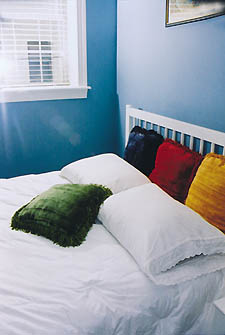 Simple elegance defines the bedroom Simple elegance defines the bedroom |
[In hallway] There’s this artist there who takes the tin tiles off the ceilings of old houses in the Carolinas. He mats them on wood frames and spray paints them all different colors. I want to get a set of about ten of them and run them all the way down this hallway. And I wanted to paint all the walls. I had promised myself that when I bought a place, I would paint them all. Growing up, my parents had only painted a couple, so I always told myself, when I have my own place, I’ll paint every room. And my furnishings are sparse, but it all tells a story. Even the stuff that’s sort of hidden relates to something.
[In bedroom] Like this porcelain vase. When I was living in Turkey, some military buddies and I stayed in this hotel for a weekend where they had rented out half of the ballroom for this porcelain convention. So it was all these military guys on one side and all these porcelain guys on the other, and we were drinking, and the next thing you know, we’re all buying each other drinks. They were Turkish, we were American. None of us understood each other at all. And at the end of the night, they gave us these little gifts and I got this vase.
 Every picture tells a story. So does every table, chair and rug: “Even the stuff that’s sort of hidden relates to something,” says Keene. Every picture tells a story. So does every table, chair and rug: “Even the stuff that’s sort of hidden relates to something,” says Keene. |
I didn’t want to go into the Air Force. I got a full ride to a writing school in Iowa, but my father didn’t want me to do that because he thought that I would, um, fuck it up. He thought I’d move to Iowa, grow my hair long, smoke dope, skip class, drop out. At the time, I didn’t feel comfortable standing up to him. But I don’t regret joining the Air Force now. I’ve seen lots of different countries, and it eventually brought me here.
When I moved here, I researched all the neighborhoods. I drove around to get a feel for the city. I don’t really hang out in Dupont unless I’m with my friends, and I wouldn’t want to live there. Too concentrated. But I don’t feel like one of those urban gay pioneers either. There’s a lot of gay people in this neighborhood, but there’s also still a lot of black people. Kids playing, grandmothers sitting on porches. For me, that’s what living in the city should be about. I just hope it keeps its character. A few blocks away, they’re already starting to sell row houses for about $400,000.
Does your house, condo or apartment have a story to tell? Let Environs know about it. E-mail environs@metroweekly.com.
Support Metro Weekly’s Journalism
These are challenging times for news organizations. And yet it’s crucial we stay active and provide vital resources and information to both our local readers and the world. So won’t you please take a moment and consider supporting Metro Weekly with a membership? For as little as $5 a month, you can help ensure Metro Weekly magazine and MetroWeekly.com remain free, viable resources as we provide the best, most diverse, culturally-resonant LGBTQ coverage in both the D.C. region and around the world. Memberships come with exclusive perks and discounts, your own personal digital delivery of each week’s magazine (and an archive), access to our Member's Lounge when it launches this fall, and exclusive members-only items like Metro Weekly Membership Mugs and Tote Bags! Check out all our membership levels here and please join us today!
Environs
DC's Brookland is a welcoming neighborhood for professional gay couple
|
Murray Jolivette, a former senior program officer at the Corporation for Public Broadcasting, and Bill Skinner, a deputy division chief of translation at the International Monetary Fund, live in the Northeast neighborhood of Brookland.
MURRAY [in kitchen]: Would you like some cake? Bill just made it. And we have strawberries and olives and nuts.
BILL: The strawberries came from the Brookland Farmers’ Market, which happens every Sunday and Tuesday. Today was its first day of the year. We couldn’t wait. Murray’s from Louisiana, so he’s got some great cooking traditions from there, and I’m from a family of bakers in Boston.
MURRAY: We haven’t done it in years, but we used to have a dessert party every year around Christmas, and Bill would bake desserts for weeks in advance. Biscotti, Christmas cookies, cakes. We’d invite a hundred people.
BILL: I’d bake a fruitcake in September, pack it in sugar and store it till Christmas. And last year we had a Gay Men of Brookland potluck cookout thing here. We got about sixty people.
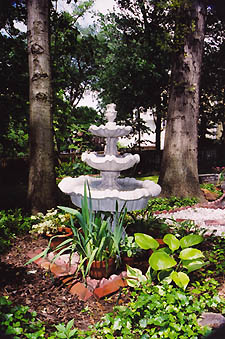 |
MURRAY: Bill’s a great baker. He went to Harvard and I worked at Harvard, but we met here in D.C. at that gym on 18th Street across from Duplex, back when it used to be called Muscle Beach. Now it’s called Third Power or something. We lived in Virginia for a while, then Boston, then Dupont Circle. When we moved to Brookland, I thought I’d miss Dupont, but I haven’t at all. We love this neighborhood, and we certainly couldn’t have this garden in Dupont.
[In garden] The whole yard is moss instead of grass. When we first moved in, the previous owners hadn’t raked a leaf in five years. It was a mess. Once we tamed the yard a bit, the moss just grew.
BILL: There was one small patch of it when we started, and every time we’d clear a space, the moss would just grow right into it.
MURRAY: As it warms up, the garden will change itself all summer long. This is our first year on the Brookland Garden Tour. The first stop on the tour is Island Jim’s. The whole interior there is a fabulous garden and beach area with a sand pit and bamboo and beach chairs —
BILL: You can sit there with your rum and your feet in the sand without having to drive to Rehoboth.
MURRAY: — and it’s owned by the people who own Colonel Brooks tavern, where those tragic murders took place. Colonel Brooks is where Brookland got its name. There’s a lot of history here.
BILL: Our house was built in 1926.
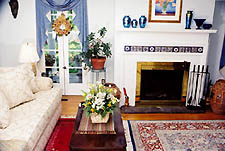 |
MURRAY: Commissioned by a chemistry professor at Catholic University. I work from here as a consultant now, and Bill used to work from home when he had his own business. [In library] This was his office, which I converted to a library. It was a surprise for him for his birthday.
BILL: I left for work one morning and it was an empty room. When I came home, it was a library. For years this was where I worked. I had my window, had all my dictionaries close by.
MURRAY [in Murray’s office]: Now I work in here. It has thirteen windows. I can see the dome of the Basilica through those trees, I can see the park where the Union defended Washington from the Confederacy.
BILL: And when a thunderstorm comes through we can watch it from up here. The trees blowing like wild. It’s really quite amazing.
Does your house, condo or apartment have a story to tell? Let Environs know about it. E-mail environs@metroweekly.com.
Support Metro Weekly’s Journalism
These are challenging times for news organizations. And yet it’s crucial we stay active and provide vital resources and information to both our local readers and the world. So won’t you please take a moment and consider supporting Metro Weekly with a membership? For as little as $5 a month, you can help ensure Metro Weekly magazine and MetroWeekly.com remain free, viable resources as we provide the best, most diverse, culturally-resonant LGBTQ coverage in both the D.C. region and around the world. Memberships come with exclusive perks and discounts, your own personal digital delivery of each week’s magazine (and an archive), access to our Member's Lounge when it launches this fall, and exclusive members-only items like Metro Weekly Membership Mugs and Tote Bags! Check out all our membership levels here and please join us today!





















